
May’s theme is #CMresilient. It was chosen by CreativeMornings Dallas and illustrated by Niki Dionne. Learn more about her work: http://creativemornings.com/…/meet-our-resilient…!
• The Pearl at Park Hill
More info
May’s theme is #CMresilient. It was chosen by CreativeMornings Dallas and illustrated by Niki Dionne. Learn more about her work: http://creativemornings.com/…/meet-our-resilient…!
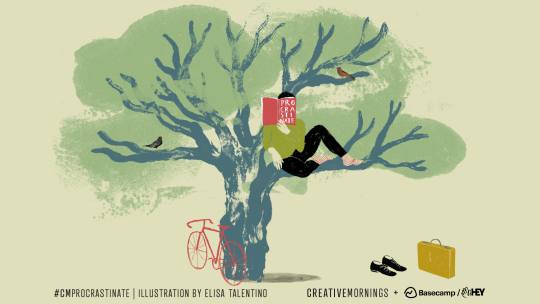
April’s theme is #CMprocrastinate. It was chosen by CreativeMornings Turin and illustrated by Elisa Talentino (https://www.facebook.com/elisa.talentino) and Basecamp/HEY is this month’s global theme partner.

March’s theme is #CMripple. It was chosen by CreativeMornings Tel Aviv and illustrated by Masha Manapov (https://www.instagram.com/mashka.man/)

February’s theme is #CMdivergent
It was chosen by CreativeMornings Valencia and illustrated by Núria Tamarit (nuriatamarit.com) Presented by our Global Partner Basecamp / Hey.com
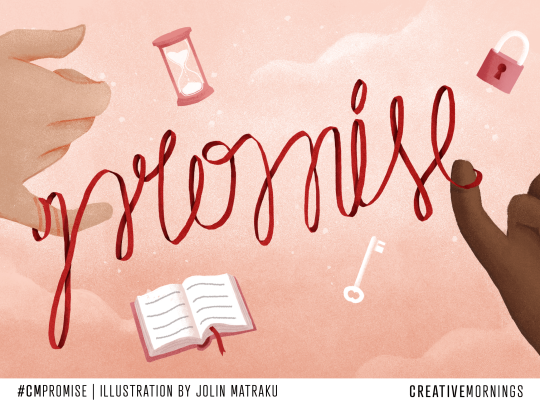
January is Promise
“Promises that are made and kept are exchanges of power.”
Our Tirana chapter chose this month’s exploration of Promise and the talented Jolin Matraku illustrated the theme.
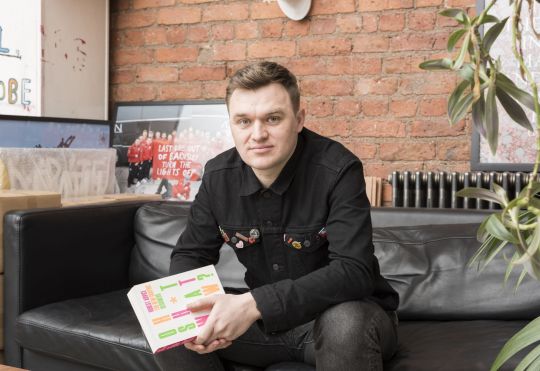
November with Craig Oldham AKA Office of Craig
Craig Oldham AKA Office of Craig is a is a designer, educator, writer, publisher, campaigner, website-up-putter, and Yorkshireman.
Craig is many things but he’s definitely not a PDF factory.Descending from generations of miners Craig was a strike baby, born as hard-working men fought for their jobs and brought up in a house full of stickers and posters and signs created by the mining community. His dad wore a denim jacket covered in badges and patches, he was also one of hundreds arrested at Orgreave.“This thing happened, everyone knows it happened, everyone knows it was wrong.”Craig lived in a community with engrained distrust in the police and grew up coping with the stigma around working class mining communities. Whilst working in London he was the butt of the office jokes for asking for a can of dandelion and burdock with his fish and chips and he was often the only northerner in the office.Working in agencies across the country, Craig became fed up and took the leap to freelance. He had no clients, no money, had split up with his girlfriend and was moving house.“It was one of the most riveting things I ever did.”With a desire to diversify his practice and make an educational and societal impact, Office of Craig was born. Craig wanted to make an impact with work that had personal meaning to him.In Loving Memory of Work was exactly that. When Barnsley Civic was marking the 35th anniversary of the strikes, Craig wanted to celebrate the creativity he’d seen in the houses he grew up in. The posters and stickers and leaflets created by the miners. Taking just a year from initial idea to print, In Loving Memory of Work tells the story of the strike from those who were making and creating at the time. Proceeds from the book and the prints – made with coal – go to the Orgreave Truth and Justice Campaign to help families uncover truth behind what happened at Orgreave and get justice for their communities.During the first coronavirus lockdown in the spring, Craig was using design to highlight injustice again. Incensed by the Government categorising anybody earning less than £25,000 ‘low-skilled’ as part of a tough new Tory immigration policy and then the very same politicians standing on their doorsteps to clap key workers – many of who were classed as low skilled just weeks before.Craig’s Key Workers print includes dozens of professions that were both vilified and performatively celebrated by the Tories, with proceeds going to Eat Well MCR—a community and volunteer-led collective preparing and delivering food to NHS staff, those in food poverty, women seeking refuge, and homeless people—each print makes 15 meals.Words by Molly McGreevy.The video from Craig’s talk is available to view here.
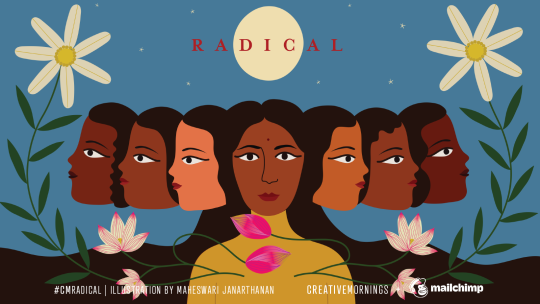
November is Radical
Our San Diego chapter chose this month’s exploration of Radical, Maheswari Janarthanan illustrated the theme, and Mailchimp is presenting the theme globally.

“How can we make space for new ideas and creative energy while staying in place?”
That was the question put to Sheffield’s creatives ahead of #CMTransit with Dame Sarah Storey AKA Active Travel Commissioner. Dame Sarah has spent the last 18 months working with Mayor of the Sheffield City Region Dan Jarvis to make South Yorkshire a place where people can cycle and walk more, to benefit the health of both people and the planet.
Britain’s most successful female Paralympian, with 38 world titles, 14 Paralympic Gold medals and 76 world records to her name, Sarah started her career in the pool in her early teens, before competing in her first Paralympic Games in Barcelona in 1992 and picking up her first medals aged just 14. After switching to cycling she’s had more than two decades of success on the roads and in the velodrome.
Sarah was due to compete at Tokyo 2020 before the Games were cancelled amidst the pandemic. Whilst training continues for the postponed Games in 2021, she’s been keeping herself busy training in her pain cave (the garage), competing in elite para-cycling races (when coronavirus restrictions allowed it!) and developing young female riders in her very own cycling team, Storey Racing.
Along with the Games, coronavirus shut down the shops, offices, schools and gyms. We were told to stay home, but one thing we were still allowed to do was leave the house for exercise.
People across the country began exploring their local area more than they ever had done before. Sometimes on foot, discovering ginnels (or snickets, jitties or alleys, depending on where you call home) they’d never been down that led to green spaces they hadn’t realised were just a few minutes walk from the front door. Or on their bike, enjoying the freedom and safety of roads abandoned by commuters and vehicles on the school run.
This, says Sarah, turned most neighbourhoods into a low-traffic neighbourhood. And people experienced how pleasant the place they live was without car congestion, exhaust fumes and dangerous parking. It was easier for people in wheelchairs to get around, safer for children to play out on their street and the air became cleaner.
Something Sarah wants to see more of in the future, and something she hopes more people will fight for in their own neighbourhood, now they’ve experience the benefits during lockdown. In the midst of the UK’s lockdown, Sarah and Mayor Jarvis published their 20-year plan for walking and cycling in South Yorkshire. Their ambitions include safe, segregated cycle routes that families would feel safe traveling on and that are wide enough for adapted bikes and trikes, residential streets which prioritise people over cars, and neighbourhoods where everything you need is no more than 20 mins walk or cycle away, taking away the need for a car for those short, everyday journeys.
For Sarah it’s about the next generation and she is determined to overcome the media criticism that all too often hinders active travel schemes, to make our neighbourhoods healthier and more pleasant places to be.
Children born today are the first generation who have a life expectancy lower than their parents. A reliance on the car for short journeys like the school run mean children are more inactive than they’ve ever been, the sheer amount of cars on the roads cause pollution that damages young lungs, and from the confines of a car seat, children miss out of engaging with nature and the wellbeing benefits that brings.
Coronavirus has touched every part of our lives in 2020. It’s changed how we socialise, educate and work in the short-term and Sarah hopes it’ll change how we travel in the long term, helping us become happier, healthier people, living in more pleasant, less polluted places.
Words by Molly McGreevy.

“How can we make space for new ideas and creative energy while staying in place?” The CreativeMornings Cleveland chapter chose this month’s exploration of Transit and Aleea Rae (aleearaeart.myportfolio.com/) illustrated it.
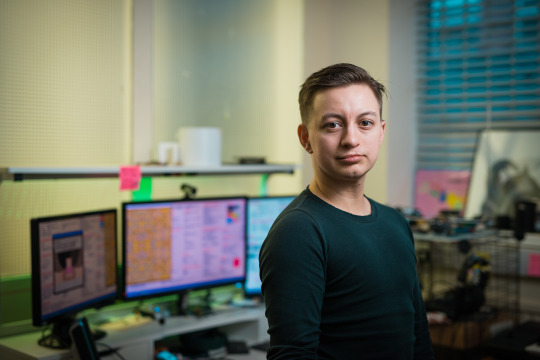
In September we were joined by Zoyander Street, an artist and researcher. They have been working in indie video games for more than a decade but their practice also involves other forms of media art and (mis)uses of technology.
Studying history and foreign languages, they became frustrated with the idea of linear text and putting one idea after another. During an internship in Japan, Zoyander found interest in objects and the story behind them. Often there was much more interest to the individual object, beyond the general history that surrounded the time it was from. From this, they realised the limitations of the linear. They wanted to allow messy things to stay messy and began to research interactive and tactile forms of expression to surface ambiguity.
“There are millions of ways to be a person.”
Zoyander used interviews with trans people to create media which showed the need for society to be flexible. Through inviting trans people across the world to share their experiences, from those struggling to access the proper healthcare they need to British trans people who are still unable to self-define their gender Zoyander used art to show the spectrums that exist in society, and that goes way beyond gender.
During their masters at the V&A, Zoyander started to develop custom hardware for festivals, galleries, and museums. And with that came an interest in creating lo-fi glitchy games, led by Zoyander’s ethnographic and historical research.
“Anybody can make a video game.”In 2017, Zoyander made Skeleton in a Beret, a film about indie games and the people who make them. The documentary moved away from the mainstream to tell different stories and experiences of gaming.
In Skeleton in a Beret, two trans people talk about how they have actively used videogames as part of how they explore not just their gender, but their skills, self-confidence, and self-expression.
Beyond films, Zoyander likes to work with ‘toxic garbage’. The garbage being old computers often destined for landfill and the toxicity from the societal issues that inspire their work. By doing something different with traumatic memories or experiences, Zoyander uses their practice – a combination of research, art and recycling, to process things that are toxic in culture and society.Photo credit: Mark Howe